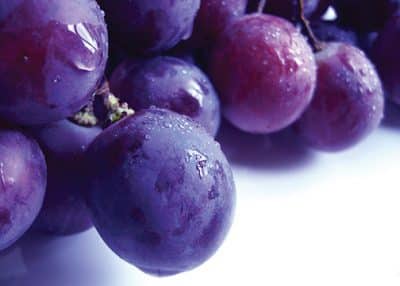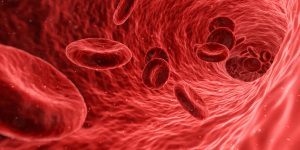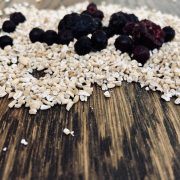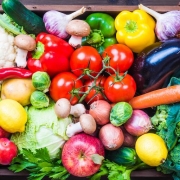Proflavanol® C100 | Proflavanol C200
USANA® Proflavanol®C 100 | Proflavanol C200: Two Powerful Antioxidants for One-of-a-Kind Health Support
USANA Proflavanol® C100
Proflavanol C200
Grape-seed extract and vitamin C unite to deliver powerful support for cardiovascular, immune, skin health, and more.*
Health trends may come and go. But the original “superfruit” still stands the test of time. Grapes have long been a source of health-protecting bioflavonoids—a powerful, beneficial type of plant compound. The seeds inside contain concentrated antioxidants that work to protect your health in many different ways. And when combined with vitamin C, the biological benefits of grape seed are enhanced for even better effectiveness.*
Get a boost of bioflavonoid power with USANA® Proflavanol® C. This one-of-a-kind supplement is made with USANA Nutritional Hybrid Technology. So, you get a combination of two potent antioxidants in one, two-layer tablet. Together, these nutrients will help you maintain good health in a number of ways:
- Neutralizes free radicals that, over time, could cause excessive oxidative stress that damages cells*
- Supports cardiovascular and circulatory health by helping to retain healthy, normal blood pressure and cholesterol levels, provided they are already in the normal range*
- Helps maintain strong veins, blood vessels, and capillaries*
- Supports balanced immune function*
- Helps maintain joint, muscle, and skin health*
Proflavanol C100 delivers 100 mg of the highest quality grape-seed extract and 300 mg of USANA’s unique Poly® C vitamin C blend in one, two-layer tablet. Or, choose Proflavanol C200 to get twice the amount of grape-seed extract in one tablet.
When you add Proflavanol C to your daily routine, you won’t just feel good about the many health benefits. A tasty grape-flavored coating on each Proflavanol C tablet makes taking your supplements even more satisfying.*
Extracting the Difference of USANA Proflavanol C
Before hitting the health benefits, let’s look a little closer at the two active ingredients in Proflavanol C. First, grape seed.
Bioflavonoids (also called flavonoids) are a diverse family of phytonutrients (nutrients from plants). They are responsible for the vibrant colors in fruits and vegetables.
The flavonoids extracted from blue or purple berries and grape seeds are called proanthocyanidins. They are also referred to as “OPCs” for oligomeric procyanidins or “PCOs” for procyanidolic oligomers.

OPCs are known to have limited absorption through the gut. That’s due to their high molecular weight and variable chemical structure. The bioavailability of the grape-seed extract (Vitis vinifera L.) in Proflavanol C has been enhanced in two ways:
- Using concentrated, smaller OPC molecules, which can be absorbed better than larger molecules found in many other extracts
- Delivering a consistent, uniquely balanced chemical composition verified to have at least 90 percent active OPCs
This premium grape-seed extract is combined with another ingredient that goes beyond what you might find in other supplements.
USANA’s Poly C combines ascorbic acid (a common form of vitamin C) with mineral salts. An in-house study found that this blend effectively raises levels of vitamin C in the body for a longer period of time than equal amounts of ascorbic acid alone. (Ascorbic acid is often the only form of vitamin C used in supplements.) The mineral forms of vitamin C are also thought to be friendlier to sensitive stomachs.*
These two uniquely powerful ingredients work together for better effectiveness than you would get with either nutrient alone. They’re what make Proflavanol C an excellent choice for supporting your health.*
Free Radicals Fear Proflavanol C
Many benefits of Proflavanol C stem from its incredible power as an antioxidant, thanks to its two main ingredients:*
- OPCs from grape seeds have antioxidant activity that rivals, or even surpasses, vitamin C and E. Plus, grape-seed extract can support cell signaling associated with your body’s natural ability to generate antioxidants for even greater defense.*
- Vitamin C has long been considered the “master antioxidant.” It actively neutralizes free radicals and helps regenerate other antioxidants, such as vitamin E.*
So, what’s the big deal about antioxidants, anyway?
Your body is naturally equipped to respond to the formation of free radicals generated through the activity of living. Everything from breathing to metabolizing your food can generate free radicals in your body.
Free radicals are highly reactive molecules that have an unpaired electron (an odd number of electrons). Nature really likes balance. So, that molecule will steal an electron from another molecule to regain stability. Generally, this process is a good thing. This activity prompts your body to initiate health-protecting responses. You need a certain amount of free radicals in your body to stay healthy.

But in today’s world, you’re bombarded with things that generate even more free radicals including:
- Unhealthy foods
- Stress
- Pollution
- Sedentary lifestyle
- UV exposure
- Smoking
- Sleep deprivation
When there are more free radicals in your body than it can handle naturally, it can cause an imbalance in oxidative stress. And if that stress sticks around too long, it leads to oxidative damage.*
Over time, oxidative stress can begin a cascade of irreparable oxidative damage to your cells, DNA, proteins, and lipids. This damage can impact proper structure and function of almost every part of your body. Everything from respiratory function to brain and cardiovascular function can be impacted by chronic oxidative stress. It’s also thought to be a significant contributor to premature aging.*
Maintaining a balance between free radicals and antioxidants is necessary for proper physiological function to support good health. Antioxidants can give you a first line of defense in protecting cells against damaging oxidative stress.*
Working together in Proflavanol C, vitamin C and grape-seed bioflavonoids provide powerful antioxidant protection to help you maintain good health.*
Get Unbeatable Cardiovascular Support with Proflavanol C
If helping your cardiovascular system stay healthy is important to you, Proflavanol C should be at the heart of your supplement regimen. Most people don’t meet the standards for a healthy heart set by American Heart Association.*
Your cardiovascular system, also called your circulatory system, consists of your heart, lungs, and blood vessels—which include arteries, capillaries, and veins. This system is responsible for moving oxygen, nutrients, waste products, and other compounds through your body in your blood. Your heart is the muscular pump. The vessels are the “superhighway” through which your blood circulates.
Keeping this system flowing smoothly means maintaining the health of your blood vessels. Proflavanol C helps support vascular function. This will aid your efforts to maintain normal, healthy blood pressure levels—provided they are healthy to begin with.*
The cardiovascular advantages of Proflavanol C come from the unique combination of antioxidants.*

Proanthocyanidins from grapes are also present in red wine. They are believed to be one of the factors that contribute to the “French Paradox”—the fact that the French maintain good heart health despite a diet high in saturated fat. And vitamin C has been associated with markers of heart health, including supporting healthy blood flow.*
The combination of grape-seed extract and vitamin C in Proflavanol C helps maintain your cardiovascular health in a couple key ways.*
First, these nutrients help defend against low-density lipoprotein oxidation (bad cholesterol). This means Proflavanol C helps maintain lipids and proteins in cholesterol from changing into unhealthy end products.*

Proflavanol C also supports or maintains healthy circulation and blood flow by protecting endothelial cells from excessive oxidative stress. These cells line the interior surface of your blood vessels and arteries. One of their many functions is making nitric oxide. This substance signals for vasodilation (a fancy word for relaxing—or dilating—your blood vessels). That allows your blood to flow through your vascular system more easily.*
Nitric oxide function can be inhibited by excessive free radical damage. By protecting endothelial cells’ ability to produce nitric oxide, Proflavanol C supports healthy circulation.*
It even supports circulation in your tiniest blood vessels—including the peripheral arteries in your fingertips. A study conducted at Boston University School of Medicine found that combining grape-seed extract with vitamin C helped retain healthy micro-vascular function. Interestingly, this only occurred when epicatechin, another of the bioflavonoids in grape-seed extract, was also present in the blood.*
The Collagen Connection: Heart, Skin, and More
Another key part of cardiovascular health is supporting the strength of your heart muscle and blood vessels. Both require collagen for structure and support. This means both require adequate amounts of vitamin C. (You also need other nutrients, like calcium and coenzyme Q10.) Because human bodies are incapable of manufacturing vitamin C, you must rely on your diet to satisfy daily requirements.*
Your body uses vitamin C to make many different types of collagen. These structural proteins are abundant throughout your body. Because they are needed to form healthy tissue.*
Here are a few of the most common types of collagen and where you’ll find them:
Type I: Fibers found in connective tissues of bone, teeth, tendons, and ligaments.
Type II: Found in cartilage.
Type III: Makes up connective tissues that give shape and strength to organs, such as the heart, liver, kidneys, etc.
Type IV: Found in the layers of cells in the blood vessels, muscles, and eye.
By supporting collagen production, Proflavanol C can help maintain a hardy heart, plus strong blood vessels, veins, and capillaries. But, as you can see, collagen is truly essential for an overall healthy body.*
Your appearance, too, can be affected by collagen. It‘s integral to skin’s elasticity and firmness. But collagen tends to start breaking down as you get older. So, taking vitamin C can help support production of this important protein.*
Your skin can also maintain health from within, with the help of the antioxidant activity provided by Proflavanol C. Defending against the oxidative effects of sun exposure may help protect against visible signs of aging. Of course, make sure to use smart sun safety measures to preserve your skin’s youthful appearance, too.*
Help Your Body Produce Immune Cells with Proflavanol C
Your immune system is an incredibly complex protective mechanism designed to shield your body. And when your shield is weakened, your body is at risk. Exposure to potentially harmful microorganisms, along with stress or even intense exercise, can temporarily tax your immune system.
Grape-seed extract works with vitamin C to support two vital aspects of your natural immunity:
- Grape-seed bioflavonoids can help support your cells’ ability to communicate with each other for healthy immune responses.*
- Vitamin C plays a role in the normal production and function of white blood cells and antibodies. You need to keep those abundant if you want a strong immune system.*
Usage
Adults, take two (2) to four (4) tablets daily, preferably with food.
Frequently Asked Questions About Proflavanol C
What’s the difference between Proflavanol C100 and Proflavanol C200 in MyHealthPak?
Proflavanol C100 and Proflavanol C200 both provide high-quality grape seed extract and vitamin C.
Each Proflavanol C100 tablet contains 100 mg of grape seed extract and 300 mg of vitamin C.
Each Proflavanol C200 tablet contains 200 mg of grape seed extract and 300 mg of vitamin C.
What’s used to sweeten the coating on Proflavanol C?
The coating of Proflavanol C is sweetened with stevia and natural grape flavor.
References
Cires MJ, Wong X, Carrasco-Pozo C, Gotteland M. 2017. The Gastrointestinal Tract as a Key Target Organ for the Health-Promoting Effects of Dietary Proanthocyanidins. Front Nutr [Internet] [accessed 13 April 2018] Available at https://www.frontiersin.org/articles/10.3389/fnut.2016.00057/full
Chen S, et al. 2015. Grape Seed Proanthocyanidin Extract Ameliorates Diabetic Bladder Dysfunction via the Activation of the Nrf2 Pathway. PLoS One 10(5) [Internet] [accessed 18 April 2018] Available at https://www.ncbi.nlm.nih.gov/pubmed/25974036
Segiev PV, Dontsova OA, Berezkin GV. 2015. Theories of aging: an ever-evolving field. 7(1): 9-18.
English J, Cass H. 2013. The Collagen Connection. Nutrition Review [Internet] [accessed 17 April 2018] Available at https://nutritionreview.org/2013/04/collagen-connection/
Other resources
You Might Also Enjoy
5 Delicious Heart Healthy Foods You’ll Love
Learn about five heart healthy foods and why they’re so good for the heart. Get tips on crafting a heart-healthy diet.
Nutritional Skincare: Beautiful Skin Starts with Your Diet
How you eat impacts the health of your skin. Discover what you can do to improve your nutritional skincare.
The next time you are out shopping, keep your immune system in mind.
*These statements have not been evaluated by the Food and Drug Administration. This product is not intended to diagnose, treat, cure, or prevent any disease.











